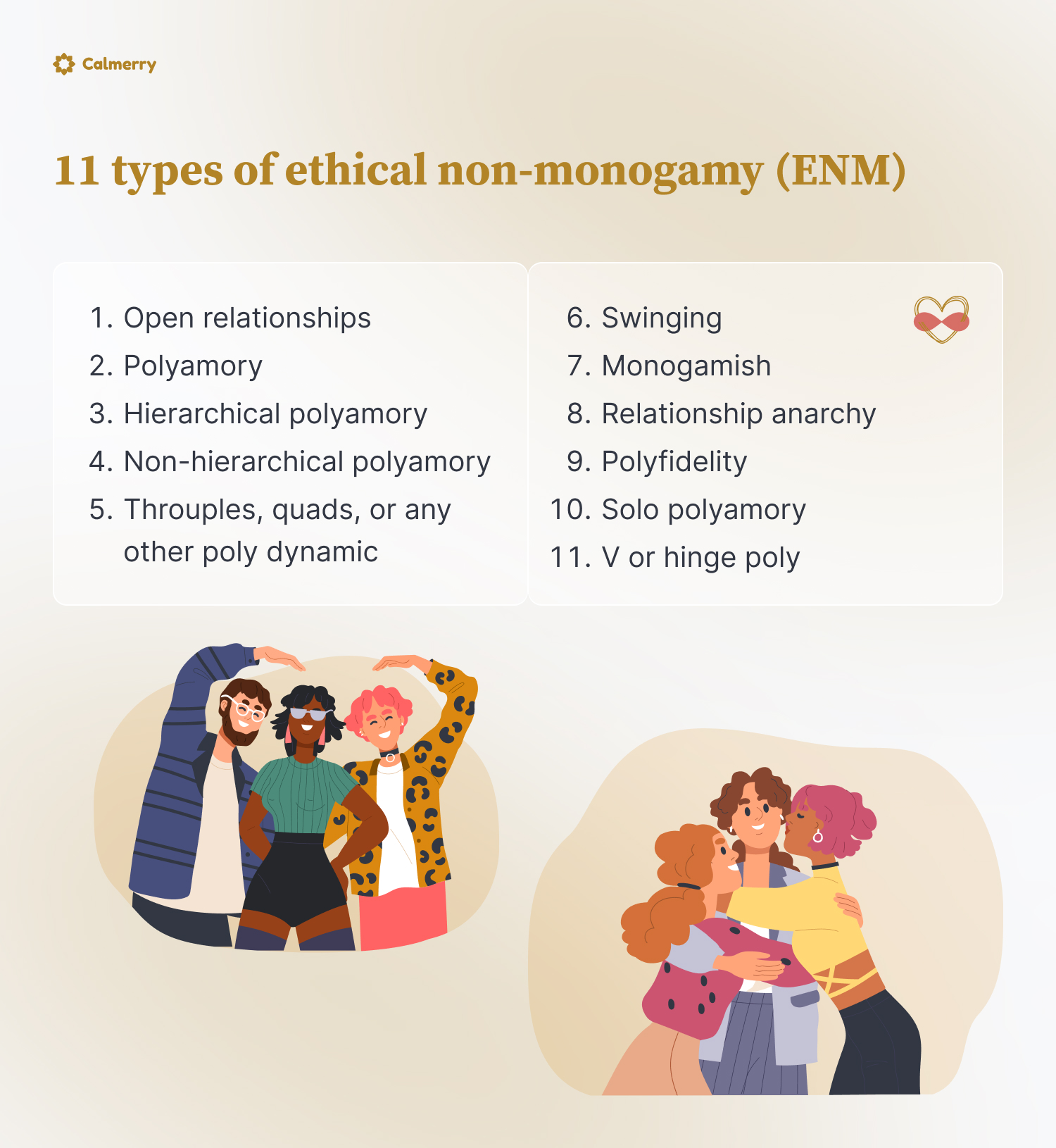A Beginner’s Guide to ENM Relationships

In this article
Long-term relationships are also prone to long-term, sustained stress, including boredom and dissatisfaction. Some couples manage this by engaging in external relationships.
When one of the partners is unaware of this happening, it’s called cheating. But when both partners are aware and give consent, this is called an ethically non-monogamous relationship.
Here’s what you need to know about ENM relationships.
What is an ENM relationship?
ENM, short for ethical non-monogamy, is a relationship dynamic where partners mutually consent to have romantic or sexual partners beyond one another.
– Alicia Ortega, Therapist-turned mental health writer
Where monogamy is one partner to meet all your needs for the rest of your life, non-monogamy is the lifestyle practice of having more than one partner.
Many people assume that ENM relationships are the same as cheating. That is, if one person is having sex or dating another person, that’s a violation of the initial understanding of being in a relationship. However, that’s where the ethical in ethical non-monogamy comes into play.
Non-ethical non-monogamy is cheating. There is secrecy, deception, and betrayal. The parties did not mutually consent.
With ENM relationships, there is also a misconception that it is a free-for-all, where partners hookup with whomever they please and aren’t accountable to one another or their external partners. This is patently false. Infidelity is possible with open relationships.
Types of ethical non-monogamy
Ethical non-monogamy can take many forms, some with more ethical considerations than others. Here are some of the major types of ethically non-monogamous relationships:

Open relationships
An open relationship refers to any type of relationship where partners are open to having and meeting other sexual or romantic partners. The limits of this dynamic depend upon the individuals involved with it.
In an open marriage or open relationship, a pair of wives can have an understanding that their partner is seeing other people, but they may not speak in-depth about those encounters.
Conversely, a couple may tell each other in great detail about their extramarital relationships and have set boundaries and rules that are routinely discussed.
A popular, although ethically-questionable type of open relationship is the “don’t ask, don’t tell” dynamic, where the members of a relationship see other people but do not discuss it with their partner at all. While the relationship is open and does not cause conflict between the partners, it lacks robust consent that would make the dynamic truly ethically sound.
Contrary to popular belief, not all ENM relationships are open! Openness refers to the partners’ willingness to experience new partnerships. In some forms of polyamory, the dynamic is closed.
For example, a wife may have two husbands with the expectation that she will only have sex and maintain a romantic relationship with those two men, and the men will do the same for her. The men may be in a romantic relationship with each other, but they also might not.
Swinging
In swinging, couples agree to have sex with other people, but the partners are always involved in some way and usually present for the sexual encounter. This can include everything from a dynamic where one partner arranges for the other to meet outside partners to group sex.
The most significant difference between swinging and other types of ENM relationships is its emphasis on sexual encounters only. Swingers may develop friendships with other swingers or outside partners, but the development and maintenance of serious romantic feelings or intimacy would be considered an emotional affair.
Polyamory
Polyamory refers to romantic and intimate connections with more than one person. There are many types of polyamorous relationships, including:
- Solo poly, where one person has many romantic relationships without having a primary partner.
- Hierarchical poly, where a couple is one another’s primary relationship, which usually comes with living together, combined finances, and/or a legally binding marriage. This couple may then seek outside partners, who typically will not have as much sway or decision-making authority in the lives of the couple.
- V or hinge poly, where one person is in a relationship with two people, but those two people are not in a relationship with one another.
- Throuples, quads, or any other poly dynamic where every partner in the relationship is romantically involved with another and has an equal share and say in the lifestyle maintained by the unit.
Ethical non-monogamy vs. polygamy
Polygamy is typically defined as plural marriage, usually one man with a number of wives.
Polygamy is illegal in many places. In many cases, this is done to protect and ensure that each person has a legal obligation to the other.
While an ethically non-monogamous relationship can certainly look like a polygamous relationship, or even have spiritual obligations, ethically non-monogamous relationships require free and uncoerced consent.
Why do people enter ENM relationships?
People choose to enter into ethically non-monogamous relationships for many reasons. For some, it is general curiosity, while for others, it takes the pressure off of a long-term committed relationship.
Here are some reasons why people maintain ENM relationships:
- Physical or emotional changes that make sex with the committed partner unfeasible
- Curiosity
- Interest in developing one’s sexuality
- Desire for more than one emotionally and romantically fulfilling relationship
- To have fun
Does ethical non-monogamy work?
Those in ENM relationships are constantly communicating with their partners and are able to spread their expectations for emotional fulfillment and excitement across a few people instead of just one person.
This leads to greater trust, increased intimacy and warmth, more honesty, and deeper connections than those in other types of relationships. [1] Moors, A. C., Conley, T. D., Edelstein, R. S., & Chopik, W. J. (2014). Attached to monogamy? Avoidance predicts willingness to engage (but not actual engagement) in consensual non-monogamy. Journal of Social and Personal Relationships, 32(2), 222–240. https://doi.org/10.1177/0265407514529065
These outcomes may be tied to a constant concerted effort by the couple to maintain the strength of their relationship which often does not take place in monogamous relationships.
– Alicia Ortega, Therapist-turned mental health writer
Ethical non-monogamy rules
The only hard and fast rule for ethical non-monogamy is that it is ethical.
That is, all the partners freely consent and are willing to communicate regarding that consent. This includes the outside partners that can be brought into the relationship via sexual or romantic connection.
Plainly, it is unethical to engage in sexual or romantic relationships with people without telling them that you are in a committed relationship with another person.
By not including this information, you take away some of the outside partner’s agency in being able to make a decision about starting a relationship with you.
How to practice ethical non-monogamy
If you’re curious about opening up your relationship or embarking on an ethically non-monogamous path, there are a few things to keep in mind.
First:
1. Assess your relationship
Opening a relationship can be triggering for many people. Anxieties regarding jealousy, abandonment, and insecurities will likely show up.
If your relationship is already struggling, you might want to examine whether you might actually want to be single.
If you believe your relationship can stand the various tests it may be faced with by opening up, you and your partner can begin discussing possible options.
2. Prepare for the conversation
When preparing to discuss changes to your relationship dynamic, you should start with a plan and anticipate the big feelings that may surface for your partner.
You don’t need to know exactly what type of non-monogamous relationship you’d like to pursue, just that you’re curious and want to explore.
– Alicia Ortega, Therapist-turned mental health writer
Try to take a stance of curiosity with your partner to gauge their feelings so that they do not feel ambushed or that you are issuing an ultimatum.
Many ENM-curious people choose not to attempt it due to fears surrounding jealousy, which develops from undermet needs for emotional security. If partners can continuously reassure one another, they can reduce the intensity of jealousy.
3. Keep communicating
There is never enough communication when it comes to ENM relationships. As you and your partner begin to explore dating other people, you should discuss what certain hypothetical situations will look like.
- For example, how involved do you want to be in your partner’s new dating life?
- Will you hold veto power over a situation, thereby requiring your partner to withdraw from an outside engagement?
- How much do you want to know about your partner’s dates?
These questions only scratch the surface of the multitude of micro-incidents that could happen and potentially trigger relationship distress.
Couples should always keep consent in mind as they continue developing their ENM identities. If something makes you uncomfortable or concerned, you and your partner should be willing to discuss and process it.
– Alicia Ortega, Therapist-turned mental health writer
Sometimes, you won’t know if something has crossed a line for you until after it happens, and that’s okay. However, you must talk about it with your partner.
4. Set boundaries
Before you start dating others, set boundaries for your relationship, both with your first partner and with others. Boundaries help everyone manage expectations.
They typically follow an “if-then” format, with the consequence or the “then” portion of the sentence being something you will do in response to your partner.
For example, you can say, “If you do not text me while on your first date, then I will call the police.” Boundaries should be continually reassessed and reinforced.
Seeking professional support from a mental health professional
Individual and relationship counseling can help you and your partner address any issues that surface as you and your partner consider opening up your relationship.
A professional counselor can help you gain insight into fears of abandonment, negotiate logistics and boundaries, and maintain the strength of your relationship.
A word from Calmerry
Online therapy makes it convenient to find mental health support on your terms while maintaining the effectiveness of in-person treatment.
Calmerry provides an easy and accessible way to connect with licensed therapists from the comfort of your own home. Our therapists are equipped and ready to help you address your individual concerns regarding jealousy, personal insecurities, and relationship frustration.
If you’re ready to take the first step, support is here and ready for you.
Moors, A. C., Conley, T. D., Edelstein, R. S., & Chopik, W. J. (2014). Attached to monogamy? Avoidance predicts willingness to engage (but not actual engagement) in consensual non-monogamy. Journal of Social and Personal Relationships, 32(2), 222–240. https://doi.org/10.1177/0265407514529065
online therapy
live video session



